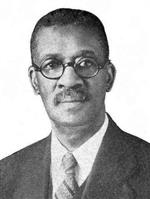- Harper Archer Elementary School
- Biography of Samuel Archer
About Us
Page Navigation
-

SAMUEL HOWARD ARCHER
(1870 – 1941)
SCHOLAR, ORATOR, AND ATHLETE
“MORE A STEADY STAR THAN A COMET”
Dr. Samuel H. Archer was a scholar, a distinguished orator, and the first African-American to play football at the prestigious ColgateUniversity. Dr. Archer became the fifth President of the Morehouse College in 1931 and headed the institution during the Great Depression. He gave the school its colors – maroon and white – the same as those of his alma mater, Colgate University. The college’s recreational facility, known as Archer Hall, was named after Dr. Samuel H. Archer for his committed services to the institution. Within this facility is a gymnasium, which seats 1000 people, a swimming pool, and a game room. The facility was used by the college’s basketball team until Forbes Arena was built.
During his thirty-six years tenure at Morehouse, Archer gained the reputation of being one of the greatest educators of all times. Marc Moreland in his article, Samuel Howard Archer: A Portrait of a Teacher (1949), says “Dr. Archer had a rare talent for handling young men. Of impressive appearance and of a wit as sharp as the fine edge of a seldom pleasure, he was to his boys, as much man as any of them and a scholar who could at once amuse and instruct. Here indeed was a teacher who won young men and influenced them for good.”
Birthplace: Chesterfield, Virginia
Education:
- Peabody Public Schools, Petersburg, Virginia
- Wayland Normal Academy, Washington, D. C.
- Colgate University, Hamilton, New York
Honorary Degrees:
- Morehouse College, 1923 – M. A.
- Colgate University, 1932 – Doctor of Divinity
Employment:
Teacher, Virginia Public Schools
Teacher, Roger Williams University, Nashville, Tennessee
Professor, Football Coach, Dean, and Vice-President, Morehouse College, Atlanta, Georgia
Fifth President , Morehouse College
Religious Affiliation: Friendship Baptist Church
Civil Service: Omega Psi Phi Fraternity
Dr. Samuel H. Archer’s greatest contribution lies in the influence he had on the lives of those who were fortunate enough to have known him. “This man forgot himself into immortality.”
